Talk 1专四新题型
英语专四模拟试题及答案
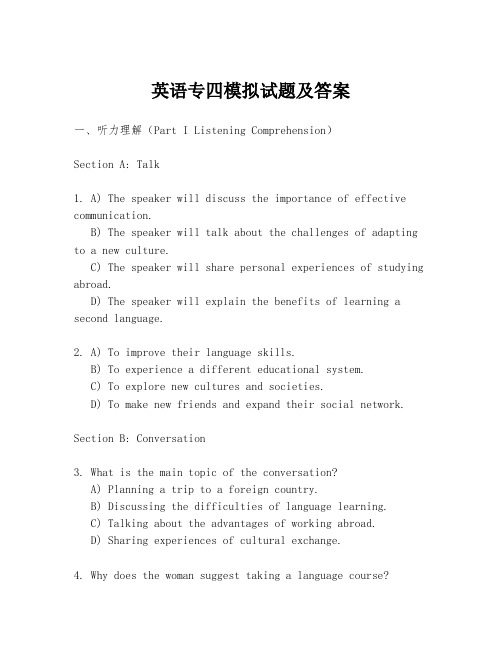
英语专四模拟试题及答案一、听力理解(Part I Listening Comprehension)Section A: Talk1. A) The speaker will discuss the importance of effective communication.B) The speaker will talk about the challenges of adapting to a new culture.C) The speaker will share personal experiences of studying abroad.D) The speaker will explain the benefits of learning a second language.2. A) To improve their language skills.B) To experience a different educational system.C) To explore new cultures and societies.D) To make new friends and expand their social network.Section B: Conversation3. What is the main topic of the conversation?A) Planning a trip to a foreign country.B) Discussing the difficulties of language learning.C) Talking about the advantages of working abroad.D) Sharing experiences of cultural exchange.4. Why does the woman suggest taking a language course?A) To prepare for a job interview.B) To enhance her travel experience.C) To meet new people.D) To improve her language proficiency.Section C: News Broadcast5. What is the news report mainly about?A) A recent scientific discovery.B) A new policy implemented by the government.C) A significant event in the sports world.D) A cultural festival celebrated around the world.6. What is the purpose of the policy mentioned in the news?A) To promote international trade.B) To encourage environmental protection.C) To improve public health.D) To support education and research.二、语言知识运用(Part II Language Knowledge Use)7-14. 完形填空:阅读下面的短文,从每题所给的四个选项中,选出最佳选项。
2021年专四答案听力原文

专四答案+听力原文Part Ⅰ DICTATIONLearning SympathyA big part of being human is feeling sympathy,/ but how early on in our lives do we learn this? / Scientists find that babies respond to other people / by crying when other babies cry. / However,babies can’t distinguish between themselves and others / until they’re eighteen to twenty months old. / Toddlers start to show concern for others around this time. / Kids also begin to do things like comforting other people. / And by the time they’re three,/ most children will try to protect a victim in a fight.Part Ⅱ LISTENING COMPREHENSIONSECTION A TALK1. a physical classroom2. a coherent concept3. personalized curriculum4. (more) meaningful practice5. feedback6. collaborative learning7. question and answer8. fundamental human right9. lifelong learning10. innovationSECTION B CONVERSATIONS1. What’s wrong with the man’s computer?答案:A. It has wiped the data from the flash drive.2. How will the man be compensated if the computer can’t be fixed?答案:C. Get a new computer.3. How did the man feel about the woman’s offer of compensation?答案:D. Dissatisfied.4. When will the service engineer come to fix the computer?答案:B. After 8:30 tomorrow morning.5. What is the man’s phone number?答案:A. 6574-3205.6. What sho uld we do if our neighbors didn’t reach out?答案:B. Introduce ourselves first.7. Which is the best way to handle a noisy neighbor?答案:C. Give him a reason to stop.8. What should we do if we have a nosy neighbor?答案:D. Don’t answer their que stions.9. How long do we expect our neighbors to stay?答案:B. Five to ten minutes.10. Where can we get more information on this topic?答案:D. CBS news website.Part III LANGUAGE USAGE11. B. Whatever12. A. on which13. C. women drivers14. B. present event for tentativeness15. D. make a suggestion16. B. disappointment17. D. would later make18. C. to have been created19. A. would have been… had been20. C. that21. B. characters22. D. ensure23. B. relieve24. A. releases25. C. indicative26. B. eye27. A. critically28. C. on29. D. bound30. A. invariablyPart IV CLOZE31. [F]implications32. [N]single33. [B]barely34. [L]online35. [C]demise36. [M]rising37. [I]naturally38. [G]leaf39. [H]lost40. [J]objectPart V READING COMPREHENSIONSECTION A MULTIPLE CHOICEQUESTIONSPASSAGE ONE41. In Para. 4,the phrase “hit the jackpot” means according to the context.答案:C. broke one of the objects42. It can be concluded from Paras. 5 and 6 that .答案:D. people hold entirely different views on the issue43. How did the author feel about the treasure from the Atocha (Para. 7)?答案:A. She was glad that people can have a chance to see the treasure.PASSAGE TWO44. It can be learned from the beginning that Miriam’s attitude tow ards love between her and Paul is .答案:C. pessimistic45. The narration in Para. 3 tells us that Miriam had all the following feelings EXCEPT . 答案:A. delight46. Which of the following statements is CORRECT about the family’s response to Paul’s mockery?答案:B. Every member except Miriam was amused.PASSAGE THREE47. Why does the author give two examples in Para. 2?答案:A. To show that literacy is interpreted in different ways.48. According to the author,the following are some of the defining features of literacy EXCEPT .答案:D. independent49. Which of the following statements about reading and writing is CORRECT?答案:C. Reading often requires more immediate interaction than writing.50. What do the last two paragraphs mainly focus on (Paras. 10 and 11)?答案:B. Effects of illiteracy and associated problems.SECTION B SHORT ANSWERQUESTIONS阐明:简答题答案不唯一,意思对即可。
专四听力talk专项训练
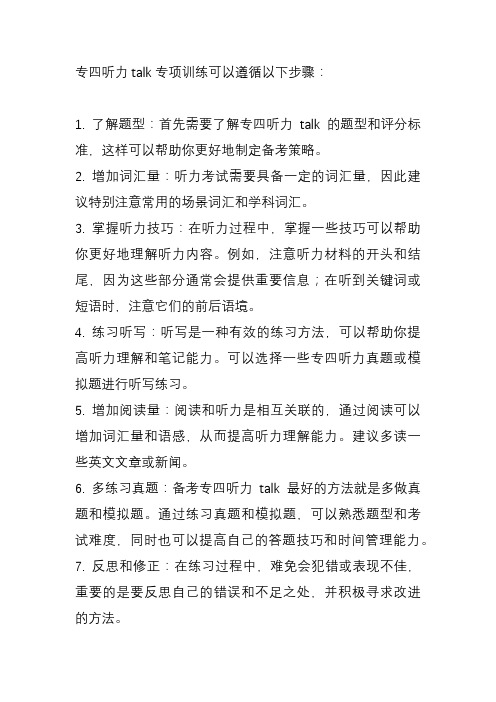
专四听力talk专项训练可以遵循以下步骤:
1. 了解题型:首先需要了解专四听力talk的题型和评分标准,这样可以帮助你更好地制定备考策略。
2. 增加词汇量:听力考试需要具备一定的词汇量,因此建议特别注意常用的场景词汇和学科词汇。
3. 掌握听力技巧:在听力过程中,掌握一些技巧可以帮助你更好地理解听力内容。
例如,注意听力材料的开头和结尾,因为这些部分通常会提供重要信息;在听到关键词或短语时,注意它们的前后语境。
4. 练习听写:听写是一种有效的练习方法,可以帮助你提高听力理解和笔记能力。
可以选择一些专四听力真题或模拟题进行听写练习。
5. 增加阅读量:阅读和听力是相互关联的,通过阅读可以增加词汇量和语感,从而提高听力理解能力。
建议多读一些英文文章或新闻。
6. 多练习真题:备考专四听力talk最好的方法就是多做真题和模拟题。
通过练习真题和模拟题,可以熟悉题型和考试难度,同时也可以提高自己的答题技巧和时间管理能力。
7. 反思和修正:在练习过程中,难免会犯错或表现不佳,重要的是要反思自己的错误和不足之处,并积极寻求改进的方法。
8. 建立信心:专四听力talk是一项挑战性的考试,但只要你认真备考并掌握正确的技巧,相信你一定能够取得好成绩。
建立信心是备考过程中非常重要的一环。
总之,专四听力talk专项训练需要注重技巧、词汇量、听写练习、阅读量、做真题以及反思和修正等方面。
通过系统的训练和坚持练习,相信你能够提高自己的听力水平并取得好成绩。
listening comprehension专四改革后新题型

Now...; About(concerning)..., As for.... Let’s take a look at...; Let’s move on to... In the next part of the lecture, I’d like to talk
about... I’d like to point out/indicate/make clear that...
Today’s lecture is about...
In today’s lecture, I will try to ..., /we will discuss...
Our topic today is ...
2016: Today, I would like to talk about my research project concerning the key to success.
测试形式:本部分为Section A, Talk Section B, conversations,共20题(以前
为30题)
SectionA Talk 本部分由一个约500 个单词的微型 讲座和一项填空任务组成。要求学生边听边做 笔记,然后完成填空任务。考试时间为10分钟, 10个空。
Section B (Conversations) 共10题.本部分由两个约 450个单词的会话组成。对话后有10道题,每道 题后有10秒的间歇,要求学生应根据所听的对 话,从每道题的四个选项中选出一个最佳答案.
个部分论点和论证关系。在听的过程中注意关键性 提示词句和段落的主题句
I would first of all like to welcome you all to the college.
2023年8月英语专业四级改革样卷新题型

2023年8月英语专业四级改革新题型(样卷)PART 1 DICTATION [10 MIN]Listen to the following passage. Altogether the passage will be read to you four times. During the first reading, which will be done at normal speed, listen and try to understand the meaning. For the second and third readings, the passage will be read sentence by sentence, or phrase by phrase, with intervals of 15 seconds. The last reading will be done at normal speed again and during this time you should check your work. You will then be given 1 minute to check through your work once more.Please write the whole passage on ANSWER SHEET ONE.PART II LISTENING COMPREHENSION [20 MIN]SECTION A TALKIn this section you will hear a talk. You will hear the talk ONCE ONLY. While listening, you may look at ANSWER SHEET ONE and write NO MORE THAN THREE WORDS for each gap. Make sure the word(s) you fill in is (are) both grammatically and semantically acceptable. You may use the blank sheet for note-taking.You have THIRTY seconds to preview the gap-filling task.Now listen to the talk. When it is over, you will be given TWO minutes to complete your work.SECTION B CONVERSATIONSIn this section you will hear two conversations. At the end of each conversation, five questions will be asked about what was said. Both the conversation and the questions will be spoken ONCE ONLY. After each question there will be a ten-second pause. During the pause, youshould read the four choices of A, B, C and D, and mark the best answer to each question on ANSWER SHEET TWO.You have thirty seconds to preview the questions.Now, listen to the conversations.Conversation One.1. A. The return trip is too expensive.B . There is no technology to get people back.C. People don’t want to return.D. The return trip is too risky.2. A. Intelligence.B. Health.C. Skills.D. Calmness.3. A. The kind of people suitable for the trip.B. Interests and hobbies of the speakers.C. Recruitment of people for the trip.D. Preparation for the trip to Mars.…Conversation Two6. A. Going to the high street. B. Visiting everyday shops.C. Buying things like electrical goods.D. Visiting shops and buying online.7. A. 3%. B. 33%.C. 42%.D. 24%.8. A. They want to know more about pricing.B. They can return the product later.C. They want to see the real thing first.D. They can bargain for a lower shop price.…PART III LANGUAGE KNOWLEDGEThere are twenty sentences in this section. Beneath each sentence there are four words, phrases or statements marked A, B, C and D. Choose one word, phrase or statement that best completes the sentence.Mark your answers on ANSWER SHEET TWO.11.When you have finished with that book, don’t forget to put it back on the shelf, ______?A. don’t youB. do youC. will youD. won’t you12.Which of the following statements is INCORRECT?A. Only one out of six were present at the meeting.B. Ten dollars was stolen from the cash register.C. Either my sister or my brother is coming.D. Five miles seem like a long walk to me.13.It is not so much the language ______ the cultural background that makes the film difficult tounderstand.A. butB. norC. likeD. as14.There is no doubt ______ the committee has made the right decision on the housing project.A. whyB. thatC. whetherD. when15.If you explained the situation to your lawyer, he ______ able to advise you much better than Ican.A. will beB. wasC. would beD. were16.Which of the following is a stative verb (静态动词)?A. Drink.B. Close.C. Rain.D. Belong.17.Which of the following italicized parts indicates a subject-verb relation?A. The man has a large family to support.B. She had no wish to quarrel with her brother.C. He was the last guest to leave.D. Mary needs a friend to talk to.18.Which of the following is INCORRECT?A. Another two girls.B. Few words.C. This work.D. A bit of flowers.19.When one has good health, ______ should feel fortunate.A. youB. sheC. heD. we20.There ______ nothing more for discussion, the meeting came to an end half an hour earlier.A. to beB. to have beenC. beD. being21.Bottles from this region sell ______ at about $50 a case.A. entirelyB. totallyC. wholesaleD. together22.The product contains no ______ colours, flavours, or preservatives.A. fakeB. artificialC. falseD. wrong23.______ and business leaders were delighted at the decision to hold the national motor fair inthe city.A. CivilB. CivilizedC. CivilianD. Civic24.The city council is planning a huge road-building programme to ease congestion. Theunderlined part means ______.A. calmB. relieveC. comfortD. still25.His unfortunate appearance was offset by an attractive personality. The underlines part meansall the following EXCEPT ______.A. improvedB. made up forC. balancedD. compensated for26.The doctor said that the gash in his cheek required ten stitches. The underlined part means______.A.B.C.D.27.During the economic crisis, they had to cut back production and ______ workers.A. lay offB. lay intoC. lay downD. lay aside28.To mark its one hundredth anniversary, the university held a series of activities includingconferences, film shows, etc. The underlined part means ______.A. signifyB. celebrateC. symbolizeD. suggest29.His fertile mind keeps turning out new ideas. The underlined part means ______.A. abundantB. unbelievableC. productiveD. generative30.These issues were discussed at length during the meeting. The underlined part means ______.A. eventuallyB. subsequentlyC. lastlyD. fullyPART IV CLOZE [10 MIN]Decide which of the words given in the box below would best complete the passage if inserted in the corresponding blanks. The words can be used ONCE ONLY. Mark the letter for each word on ANSWER SHEET TWO.A. asB. aimlessC. botherD. fastE. flightsF. helplessG. labor-savingH. levels I. money-saving J. pause K. quite L. stand by M. standstillN. traffic O. trappedElectricity is such a part of our everyday lives and so much taken for granted nowadays that we rarely think twice when we switch on the light or turn on the TV set. At night, roads are brightly lit, enabling people and (31) ______ to move freely. Neon lighting used in advertising has become part of the character of every modern city. In the home, many (32) ______ devices are powered by electricity. Even when we turn off the bedside lamp and are (33) ______ asleep, electricity is still working for us, driving our refrigerators, heating our water, or keeping our rooms air-conditioned. Every day, trains and subways take us to and from work. We rarely (34) ______ to consider why or how they run—until something goes wrong.In the summer of 1959, something did go wrong with power-plant that provided New York with electricity. For a great many hours, life came almost to a (35) ______. Trains refused to move and the people in them sat in the dark, powerless to do anything; lifts stopped working, so that even if you were lucky enough not to be (36) ______ between two floors, you had the unpleasant task of finding your way down (37) ______of stairs.Famous streets like Broadway and Fifth Avenue in an instant becameas gloomy and uninviting (38) ______ the most remote back streets. People were afraid to leave their houses, for although the police had been ordered to (39) ______ in case of emergency. they were just as confused and (40) ______ as anybody else.PART V READING COMPREHENSION [35 MIN]SECTION A MULTIPLE-CHOICE QUESTIONSIn this section there are several passages followed by ten multiple-choice questions. For each question, there are four suggested answers marked A, B, C and D. Choose the one that you think is the best answer and mark your answers on ANSWER SHEET TWO.PASSAGE ONEInundated by more information than we can possibly hold in our heads, we’re increasingly handing off the job of remembering to search engines and smart phones. Google is even reportedly working on eyeglasses that could one day recognize faces and supply details about whoever you’re looking at. But new research shows that outsourcing our memory –and expecting that information will be continually and instantaneously available – is changing our cognitive habits. Research conducted by Betsy Sparrow, an assistant professor of psychology at Columbia University, has identified three new realities about how we process information in the Internet age. First, her experiments showed that when we don’t know the answer to a question, we now think about where we can find the nearest Web connection instead of the subject of the question itself. A second revelation is that when we expect to be able to find in formation again later on, we don’t remember it as well as when we think it might become unavailable. And then there is the researchers’ final observation: the expectation that we’ll he able to locate information down the line leads us to form a memory not of the fact itself but of where we’ll be able to find it.But this handoff comes with a downside. Skills like critical thinking and analysis must develop in the context of facts: we need something to think and reason about, after all. And these factsc an’t be Googled as we go; they need to be stored in the original hard drive, our long-term memory. Especially in the case of children, “factual knowledge must precede skill,” says Daniel Willingham, a professor of psychology, at the University of Virginia – meaning that the days of drilling the multiplication table and memorizing the names of the Presidents aren’t over quite yet. Adults, too, need to recruit a supply of stored knowledge in order to situate and evaluate new information they encounter. You ca n’t Google context.Last, there’s the possibility, increasingly terrifying to contemplate, that our machines will fail us. As Sparrow puts it, “The experience of losing our Internet connection becomes more and more like losing a friend.” If you’re going to keep your memory on your smart phone, better make sure it’s fully charged.41. Google’s eyeglasses are supposed to ____.A. improve our memoryB. function like memoryC. help us see faces betterD. work like smart phones42. Which of the following statements about Sparrow’s research is CORRECT?A. We remember people and things as much as before.B. We remember more Internet connections than before.C. We pay equal attention to location and content of information.D. We tend to remember location rather than the core of facts.43. What is the implied message of the author?A. Web connections aid our memory.B. People differ in what to remember.C. People keep memory on smart phones.D. People need to exercise their memory.PASSAGE TWOI was a second-year medical student at the university, and was on my second day of rounds at a nearby hospital. My university’s philosophy was to get students seeing patients early in their education. Nice idea, but it overlooked one detail: second-year students know next to nothing about medicine.Assigned to my team that day was an attending – a senior faculty member who was there mostly to make patients feel they weren’t in the hands of amateurs. Many attendings were researchers who didn’t have much recent hos pital experience. Mine was actually an arthritis specialist. Also along was a resident (the real boss, with a staggering mastery of medicine, at least to a rookie like myself). In addition there were two interns(住院实习医生). These guys were just as green as I was,but in a scarier way: they had recently graduated from the medical school, so they were technically MDs.I began the day at 6:30am. An intern and I did a quick check of our eight patients; later, we were to present our findings to the resident and then to the attending. I had three patients and the intern had the other five - piece of cake.But when I arrived in the room of 71-year-old Mr. Adams,he was sitting up in bed, sweating heavily and panting (喘气). He’d just had a hip operation and looked terrible. I listened to his lungs with my stethoscope, but they sounded clear. Next I checked the log of his vital signs and saw that his respiration and heart rate had been climbing, but his temperature was steady. It didn’t seem like heart failure, nor did it appear to be pneumonia. So I asked Mr. Adams what he thought was going on.“It’s really hot in here, Doc,” he replied.So I attributed his condition to the stuffy room and told him the rest of the team would return in a few hours. He smiled and feebly waved goodbye.At 8:40 am., during our team meeting, “Code Blue Room 307!” blared from the loudspeaker.I froze.That was Mr. Adams’s room.When we arrived, he was motionless.The autopsy (尸体解剖) later found Mr. Adams had suffered a massive pulmonary embolism (肺部栓塞). A blood clot had formed in his leg, worked its way to his lungs, and cut his breathing capacity in half. His symptoms had been textbook: heavy perspiration and shortness of breath despite clear lungs. The only thin g was: I hadn’t read that chapter in the textbook yet. And I was too scared, insecure, and proud to ask a real doctor for help.This mistake has haunted me for nearly 30 years, but what’s particularly frustrating is that the same medical education system persists. Who knows how many people have died or suffered harm at the hands of students as naïve as I, and how many more will?44. We learn that the author’s team members had _____.A. much practical experienceB. adequate knowledgeC. long been working thereD. some professional deficiency45. “His symptoms had been textbook” means that his symptoms were ______.A. part of the textbookB. no longer in the textbookC. recently included in the textbookD. explained in the textbook46. At the end of the passage, the author expresses ____ about the medical education systemA. optimismB. hesitationC. concernD. supportPASSAGE THREEThe war on smoking, now five decades old and counting, is one of the nation’s greatest public health success stories – but not for everyone.As a whole, the country has made amazing progress. In 1964, four in ten adults in the US smoked; today fewer than two in ten do. But some states – Kentucky, South Dakota and Alabama, to name just a few – seem to have missed the message that smoking is deadly.Their failure is the greatest disappointment in an effort to save lives that was started on Jan. 11, 1964, by the first Surgeon General’s Report on Smoking and Health. Its finding that smoking is a cause of lung cancer and other diseases was major news then. The hazards of smoking were just starting to emerge.The report led to cigarette warning labels, a ban on TV ads and eventually an anti-smoking movement that shifted the nation’s attitude on smoki ng. Then, smokers were cool. Today, many are outcasts, rejected by restaurants, bars, public buildings and even their own workplaces. Millions of lives have been saved.The formula for success is no longer guesswork: Adopt tough warning labels, air public service ads, fund smoking cessation programs and impose smoke-free laws. But the surest way to prevent smoking, particularly among price-sensitive teens, is to raise taxes. If you can stop them from smoking, you’ve won the war. Few people start smoking after turning 19.The real-life evidence of taxing power is powerful. The 10 states with the lowest adult smoking rates slap an average tax of $2.42 on every pack – three times the average tax in the states with the highest smoking rates.New York has the highest cigarette tax in the country, at $4.35 per pack, and just 12 percent of teens smoke, far below the national average of 18 percent. Compare that with Kentucky, where taxes are low (60 cents), smoking restrictions are weak and the teen smoking rate is double New York’s. Other low-tax states have similarly dismal records.Enemies of high tobacco taxes cling to the tired argument that they fall disproportionately on the poor. True, but so do the deadly effects of smoking – far worse than a tax. The effect of the taxes is amplified further when the revenue is used to fund initiatives that help smokers quit or persuade teens not to start.Anti-smoking forces have plenty to celebrate this week, having helped avoid 8 million premature deaths in the past 50 years. But as long as 3,000 adolescents and teens take their first puff each day, the war is not won.47. According to the context, “Their failure” refers to _____.A. those adults who continue to smokeB. those states that missed the messageC. findings of the reportD. hazards of smoking48. What is the passage mainly about?A. How to stage anti-smoking campaigns.B. The effects of the report on smoking and health.C. Tax as the surest path to cut smoking.D. The efforts to cut down on teenage smoking.PASSAGE FOURAttachment Parenting is not Indulgent Parenting. Attachment parents do not “spoil” their children. Spoiling is done when a child is given everything that they want regardless of what they need and regardless of what is practical. Indulgent parents give toys for tantrums(发脾气), ice cream for breakfast. Attachment parents don’t give their children everything that they want, they give their children everything that they need. Attachment parents believe that love and comfort are free and necessary. Not sweets or toys.Attachment Parenting is not “afraid of tears” parenting. Our kids cry. The difference is that we understand that tantrums and tears come from emotions and not manipulation. And our children understand this too. They cry and have tantrums sometimes, of course. But they do this because their emotions are so overwhelming that they need to get it out. They do not expect to be “rewarded” for their strong negative emotions; they simply expect that we will listen. We pick up our babies when they cry, and we respond to the tears of our older children because we believe firmly that comfort is free, love is free, and that when a child has need for comfort and love, it isour job to provide those things. We are not afraid of tears. We don’t avoid them. We hold our children through them and teach them that when they are hurt or frustrated we are here to comfort them and help them work through their emotions.Attachment Parenting is not Clingy Parenting. I do not cling to my children. In fact, I’m pretty free-range. As soon as they can move they usually move away from me and let me set up a chase as they crawl, run, skip and hop on their merry way to explore the world. Sure, I carry them and hug them and chase them and kiss them and rock them and sleep with them. But this is not me following them everywhere and pulling them back to me. This is me being a home base. The “attachment” comes from their being allowed to attach to us, not from us attaching to them like parental leeches.Attachment Parenting is not Selfish Parenting. It is also not selfless parenting. We are not doing it for us, and we are not doing it to torment ourselves,Attachment parenting is not Helicopter Parenting. I don’t hover. I supervise, I follow, I teach, I de monstrate, I explain. I don’t slap curious hands away, I show how to do things safely, I let my child do the things that my child wishes to do, first with help and then with supervision and finally with trust. I don’t insist that my 23 month old hold my ha nd when we walk on the sidewalk because I know that I can recall him with my voice because he trusts me to allow him to explore and he trusts me to explain when something is dangerous and to help him satisfy his curiosities safely.Most of the negative thi ngs that I hear about “attachment parents” are completely off-base and describe something that is entirely unlike Attachment Parenting. Attachment Parenting is child-centric and focuses on the needs of the child. Children need structure, rules, and boundaries. Attachment Parents simply believe that the child and the parent are allies, not adversaries, And that children are taught, not trained.49. According to the author, what should parents do when their kids cry?A. Providing comfort and love.B. Trying to stop kids crying.C. Holding them till they stop.D. Rewarding kids with toys.50. What does “free-range” mean according to the passage?A. Fond of providing a home base.B. Ready to play games with my kids.C. Curious to watch what games they play.D. Willing to give kids freedom of movement.SECTION B SHORT ANSWER QUESTIONSIn this section there are five short answer questions based on the passages in Section A. Answer the questions with NO more than TEN words in the space provided on ANSWER SHEET TWO.PASSAGE ONE51. According to the passage, what does “cognitive habits” refers to?PASSAGE TWO52. Why was the author doing rounds in a hospital?PASSAGE THREE53. What does “counting” mean in the context?54. What does the author think of raising tax on cigarettes?PASSAGE FOUR55. What does the passage mainly discuss?PART VI WRITING [45 MIN]Should we revive traditional Chinese characters or continue using simplified characters?This has been an intensely discussed question for years. The following are the supporters’and opponents’ opinions. Read carefully the opinions from both sides and write your response in about 200 words, in which you should first summarize briefly the opinions from both sides and give your view on the issue.Marks will be awarded for content relevance, content sufficiency, organization and language quality. Failure to follow the above instructions may result in a loss of marks.。
TEM 4 talk填空技巧
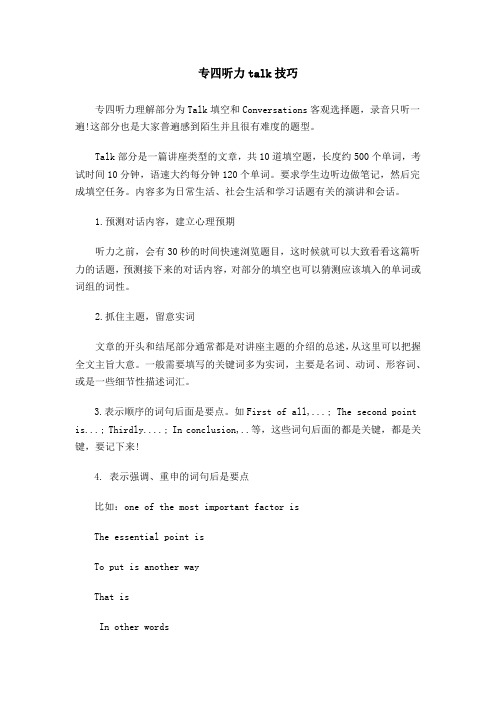
专四听力talk技巧专四听力理解部分为Talk填空和Conversations客观选择题,录音只听一遍!这部分也是大家普遍感到陌生并且很有难度的题型。
Talk部分是一篇讲座类型的文章,共10道填空题,长度约500个单词,考试时间10分钟,语速大约每分钟120个单词。
要求学生边听边做笔记,然后完成填空任务。
内容多为日常生活、社会生活和学习话题有关的演讲和会话。
1.预测对话内容,建立心理预期听力之前,会有30秒的时间快速浏览题目,这时候就可以大致看看这篇听力的话题,预测接下来的对话内容,对部分的填空也可以猜测应该填入的单词或词组的词性。
2.抓住主题,留意实词文章的开头和结尾部分通常都是对讲座主题的介绍的总述,从这里可以把握全文主旨大意。
一般需要填写的关键词多为实词,主要是名词、动词、形容词、或是一些细节性描述词汇。
3.表示顺序的词句后面是要点。
如First of all,...; The second point is...; Thirdly....; In conclusion,..等,这些词句后面的都是关键,都是关键,要记下来!4. 表示强调、重申的词句后是要点比如:one of the most important factor isThe essential point isTo put is another wayThat isIn other wordsOf course5. 逻辑关系词(转折、因果等)后是要点例如:however, but, in addition, consequently, therefore, in contrast, on the contrary, on the other hand等。
6. 表达观点的词句后是要点包括:believe, find, think, hold the view, according to等7. 表示举例的词句后是要点包括: for example, for instance, such as, namely, that is等。
火星英语专四talk训练题
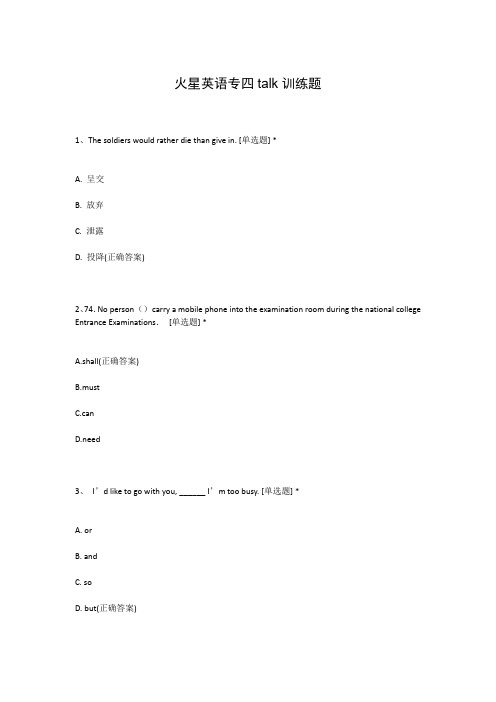
火星英语专四talk训练题1、The soldiers would rather die than give in. [单选题] *A. 呈交B. 放弃C. 泄露D. 投降(正确答案)2、74.No person ()carry a mobile phone into the examination room during the national college Entrance Examinations.[单选题] *A.shall(正确答案)B.mustC.canD.need3、I’d like to go with you, ______ I’m too busy. [单选题] *A. orB. andC. soD. but(正确答案)4、We had a(an)_____with him about this problem last night. [单选题] *A.explanationB.impressionC.exhibitionD.discussion(正确答案)5、Mr. Wang is coming to our school. I can’t wait to see _______. [单选题] *A. herB. him(正确答案)C. itD. them6、I think you should buy this novel. It is really worth _____. [单选题] *A. reading(正确答案)B. being readC. readD. to read7、He runs so fast that no one can _______ him. [单选题] *A. keep upB. keep awayC. keep up with(正确答案)D. keep on8、Henry lives happily with his three cats. _______ of them are part of his family. [单选题] *A. NoneB. BothC. All(正确答案)D. Neither9、--Whose _______ are these?? ? ? --I think they are John·s. [单选题] *A. keyB. keyesC. keys(正确答案)D. keies10、The car _______ after forty minutes driving, so he didn’t have the interview on time. [单选题] *A. broke down(正确答案)B. broke inC. broke outD. broke up11、I haven’t met him _____ the last committee meeting. [单选题] *A. forB. since(正确答案)C. atD. before12、If you do the same thing for a long time, you'll be tired of it. [单选题] *A. 试图B. 努力C. 厌倦(正确答案)D. 熟练13、The teachers don't make us wear a school uniform and we can wear _____ we like. [单选题] *A. anyB. thatC. asD. what(正确答案)14、____ China is ____ old country with ____ long history. [单选题] *A. /, an, a(正确答案)B. The, an, aC. /, an, /D. /, the, a15、He asked for help from his friends who owned a computer company in New York. [单选题] *A. 拥有(正确答案)B. 经营C. 工作D. 了解16、Growing vegetables()constantly watering. [单选题] *A. neededB. are neededC. were neededD. needs(正确答案)17、We often go to the zoo _______ Saturday mornings. [单选题] *A. atB. inC. on(正确答案)D. of18、78.According to a report on Daily Mail, it’s on Wednesday()people start feeling really unhappy. [单选题] *A. whenB. whichC. whatD. that(正确答案)19、38.—Do you have ________else to say for your mistake?—________but sorry. [单选题] *A.anything; SomethingB.something; EverythingC.anything; Nothing(正确答案)D.something; Anything20、He went to America last Friday. Alice came to the airport to _______ him _______. [单选题] *A. take; offB. see; off(正确答案)C. send; upD. put; away21、---Excuse me sir, where is Room 301?---Just a minute. I’ll have Bob ____you to your room. [单选题] *A. show(正确答案)B. showsC. to showD. showing22、We can see ______ stars at night if it doesn’t rain. [单选题] *A. a thousand ofB. thousandsC. thousand ofD. thousands of(正确答案)23、It is important for us _______ English well. [单选题] *A. learnB. learningC. to learn(正确答案)D. learned24、Kids will soon get tired of learning _____ more than they can. [单选题] *A. if they expect to learnB. if they are expected to learn(正确答案)C. if they learn to expectD. if they are learned to expect25、( ) _____ New York _____ London have traffic problems. [单选题] *A. All…andB. Neither….norC. Both…and(正确答案)D. Either…or26、During the Mid-Autumn Festival, family members often gather together _________ ameal, admire the moon and enjoy moon cakes. [单选题] *A. shareB. to share(正确答案)C. having sharedD. shared27、50.—The sweater is not the right ________ for me.—Well, shall I get you a bigger one or a smaller one? [单选题] *A.priceB.colorC.size(正确答案)D.material(材料)28、—_____ are the Olympic Games held? —Every four years [单选题] *A. How longB. How often(正确答案)C. How soonD. How far29、35.___________ good music the teacher is playing! [单选题] *A.What(正确答案)B.HowC.What aD.What the30、44.—Hi, Lucy. You ________ very beautiful in the new dress today.—Thank you very much. [单选题] *A.look(正确答案)B.watchC.look at D.see。
专四新题型改革(2016)
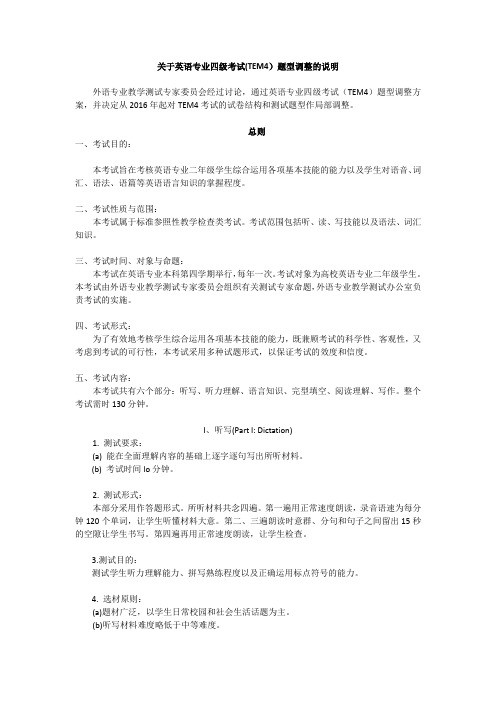
关于英语专业四级考试(TEM4)题型调整的说明外语专业教学测试专家委员会经过讨论,通过英语专业四级考试(TEM4)题型调整方案,并决定从2016年起对TEM4考试的试卷结构和测试题型作局部调整。
总则一、考试目的:本考试旨在考核英语专业二年级学生综合运用各项基本技能的能力以及学生对语音、词汇、语法、语篇等英语语言知识的掌握程度。
二、考试性质与范围:本考试属于标准参照性教学检查类考试。
考试范围包括听、读、写技能以及语法、词汇知识。
三、考试时间、对象与命题:本考试在英语专业本科第四学期举行,每年一次。
考试对象为高校英语专业二年级学生。
本考试由外语专业教学测试专家委员会组织有关测试专家命题,外语专业教学测试办公室负责考试的实施。
四、考试形式:为了有效地考核学生综合运用各项基本技能的能力,既兼顾考试的科学性、客观性,又考虑到考试的可行性,本考试采用多种试题形式,以保证考试的效度和信度。
五、考试内容:本考试共有六个部分:听写、听力理解、语言知识、完型填空、阅读理解、写作。
整个考试需时130分钟。
I、听写(Part I: Dictation)1. 测试要求:(a) 能在全面理解内容的基础上逐字逐句写出所听材料。
(b) 考试时间lo分钟。
2. 测试形式:本部分采用作答题形式。
所听材料共念四遍。
第一遍用正常速度朗读,录音语速为每分钟120个单词,让学生听懂材料大意。
第二、三遍朗读时意群、分句和句子之间留出15秒的空隙让学生书写。
第四遍再用正常速度朗读,让学生检查。
3.测试目的:测试学生听力理解能力、拼写熟练程度以及正确运用标点符号的能力。
4. 选材原则:(a)题材广泛,以学生日常校园和社会生活话题为主。
(b)听写材料难度略低于中等难度。
(c)听写材料长度约80-90个单词。
II. 听力理解(Part II: Listening Comprehension)1.测试要求:(a)能听懂英语国家人士关于日常生活、社会生活和学习的演讲和会话。
the studio school 专四talk听力

the studio school 专四talk听力一、听力第一节(共5小题,每小题1分)听下面5段对话。
每段对话后有一个小题,从题中所给的A、B、C三个选项中选出最佳选项,并标在试卷的'相应位置。
听完每段对话后,你都有10秒钟的时间来回答有关小题和阅读下一小题。
每段对话仅读一遍。
1、Who is the man talking about now?A.His girlfriend.B.His sister.C.His mother.2、What are they talking about?A.A traffic accident.B.A fire.C.A crime.3、Where does the conversation most probably take place?A.At a bookshop.B.At a kitchen.C.At a bank.4、Who was injured?A.George.B.George’s wife.C.George’s wife’s father.5、What do we learn from the conversation?A.Tony could not continue the experiment.B.Tony finished the experiment last night.C.Tony will go on with his experiment.第二节(共15小题,每小题1分)听下面5段对话或独白。
每段对话或独白后有几个小题,从题中所给的A、B、C三个选项中选出最佳选项,并标在试卷的相应位置。
听每段对话或独白前,你将有时间阅读各个小题,每小题5秒钟;听完后,各小题将给出5秒钟的作答时间。
每段对话或独白读两遍。
听第6段材料,回答第6至7题。
6、Where does this conversation most likely take place?A.In the street.B.At the woman’s home.C.Over the phone.7、What is the woman going to do tonight?A.Help her sister with English.B.Meet her friend at the station.C.Go to an exhibition with her parents.听第7段材料,回答第8至10题。
英语专业四级听力对话常考题型

英语专业四级听力(tīnglì)对话常考题型听力理解(lǐjiě)--对话对话(duìhuà)的常考题型1.主旨(zhǔzhǐ)要义题:问对话讨论的是什么。
a. 尽量在脑海中描述出正进行的对话:对谁在进行对话,在哪里进行对话做一定的假设;b. 尤其注意听一些关键词,被重复的词等等;c. 对所听到的内容进行归纳,什么是中心思想;d. 特别注意提问句,因为(yīn wèi)对话通常是一问一答,答的内容通常是围绕问题展开的。
常见的就对话主题而提的问题有:What is the main topic of the conversation?What are the speakers mainly discussing?What is the subject of this conversation?What is the main idea of the conversation?Which of the following best summarizes the conversation?2.身份职业题:问说话者的身份、职业以及两者的关系等。
常见的就身份、职业及人物关系而提的问题有:What is the person's probable vocation/job?Who are the speakers?What is the relationship between the two speakers?Who is the woman/man speaking to?常见的身份、职业及其相关的词语和句子:Customer and shop-assistant (salesgirl)for sale on sale discount 30 percent offselling season size style fashionin stock out of stock price changerefund warranty deliver 交付 sales slip 销货单,销售发票What can I do for you? I'm looking for...I'd like to have ... How much ...?Professor/teacher and studentcourse assignment credit tuitionfreshman sophomore junior seniorundergraduate postgraduate register graduategraduation ceremony term paper mid-exam finalsummer course grade semester/term quizvacation scholarshipCustomer and waiter/waitressmenu order dessert main coursedelicious taste reservation billCan I help you, sir/madam? Are you ready to order?May I take your order now? I'd like to try...Can I have my bill, please? How would you like your beef? Doctor and patientheadache stomachache backache catch a coldflu running nose fever run a temperaturesymptom examination check-up take one's temperatureX-ray indigestion blood pressure infectiondiagnose prescribe(prescription) medicine pilltablet give an injection operation recoverWhat's the matter with you?Postman and customerparcel/package postcard stamp telegrampostage airmail registered letterBank clerk and customerdeposit withdraw draw out savingsaccount account number open an account balancecash traveler's check cash a check interest rateAirport staff and travelercheck in check out first class economySingle/return flight number reservation book a ticket Confirm/confirmation arrival departure delayBoarding card boarding gate take off transitLibrarian and studentLibrary card periodical journal magazineCatalogue call number due renewOverdue over-due timeHotel staff and customerlobby front desk reservation reception deskreceptionist check in check out single roomdouble room rate key card Room Service3.地点方位问题:问对话发生的地点与场景。
最新【星火英语版】英语专业四级考试真题参考答案(含题干)
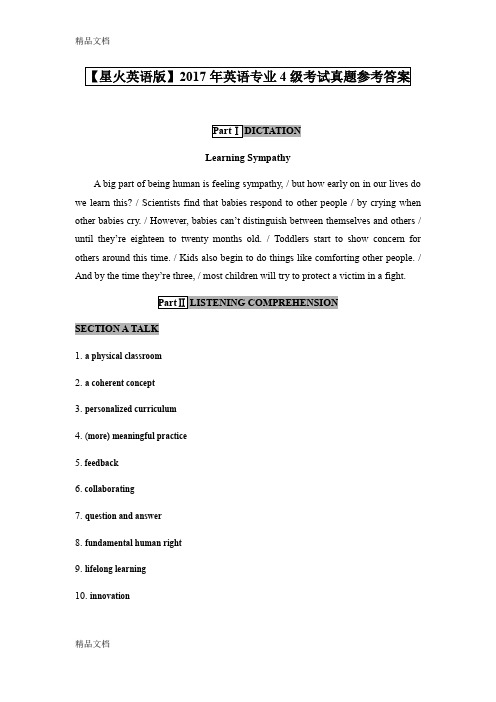
Learning SympathyA big part of being human is feeling sympathy, / but how early on in our lives do we learn this? / Scientists find that babies respond to other people / by crying when other babies cry. / However, babies can’t distinguish between themselves and others / until they’re eighteen to twenty months old. / Toddlers start to show concern for others around this time. / Kids also begin to do things like comforting other people. / And by the time th ey’re three, / most children will try to protect a victim in a fight.SECTION A TALK1. a physical classroom2. a coherent concept3. personalized curriculum4. (more) meaningful practice5.feedback6.collaborating7. question and answer8. fundamental human right9. lifelong learning10. innovationSECTION B CONVERSATIONS1.What’s wrong with the man’s computer?答案:A. It has wiped the data from the flash drive.2.How will the man be compensated if the computer can’t be fixed?答案:C. Get a new computer.3.How did the man feel about the woman’s offer of compensation?答案:D. Dissatisfied.4.When will the service engineer come to fix the computer?答案:B. After 8:30 tomorrow morning.5.What is the man’s phone number?答案:A. 6574-3205.6.What should we do if our neighbors didn’t reach out?答案:B. Introduce ourselves first.7.Which is the best way to handle a noisy neighbor?答案:C. Give him a reason to stop.8.What should we do if we have a nosy neighbor?答案:D. Don’t answer their questions.9.How long do we expect our neighbors to stay?答案:B. Five to ten minutes.10.Where can we get more information on this topic?答案:D. CBS news website.11. B. Whatever12. A. on which13. C. women drivers14. B. present event for tentativeness15. D. make a suggestion16. B. disappointment17. D. would later make18. C. to have been created19. A. would have been...had been20. C. that21. B. characters22. D. ensure23. B. relieve24. A. releases25. C. indicative26. B. eye27. A. critically28. C. on29. D. bound30. A. invariably31.[F]implications32.[N]single33.[B]barely34.[L]online35.[C]demise36.[M]rising37.[I]naturally38.[G]leaf39.[H]lost40.[J]objectSECTION A MULTIPLE CHOICE QUESTIONSPASSAGE ONE41. In Para. 4, the phrase “hit the jackpot” means according to the context.答案:B. found the treasure42. It can be concluded from Paras. 5 and 6 that .答案:D. people hold entirely different views on the issue43. How did the author feel about the treasure from the Atocha (Para. 7)?答案:A. She was glad that people can have a chance to see the treasure.PASSAGE TWO44. It can be learned from the beginning that Miriam’s attitude towards love between her and Paul is .答案:C. pessimistic45. The narration in Para.3 tells us that Miriam had all the following feelings EXCEPT .答案:A. delight46. Which of the following statements is CORRECT about the family’s response to Paul’s mockery?答案:B. Every member except Miriam was amused.PASSAGE THREE47. Why does the author give two examples in Para. 2?答案:A. To show that literacy is interpreted in different ways.48. According to the author, the following are some of the defining features of literacy EXCEPT .答案:D. independent49. Which of the following statements about reading and writing is CORRECT?答案:C. Reading often requires more immediate interaction than writing.50.What do the last two paragraphs mainly focus on (Paras. 10 and 11)?答案:B. Effects of illiteracy and associated problems.SECTION B SHORT ANSWER QUESTIONS说明:简答题答案不唯一,意思对即可。
